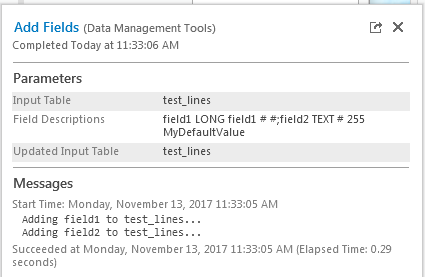- Home
- :
- All Communities
- :
- Developers
- :
- ArcGIS Pro SDK
- :
- ArcGIS Pro SDK Questions
- :
- Call AddFields_management from c#
- Subscribe to RSS Feed
- Mark Topic as New
- Mark Topic as Read
- Float this Topic for Current User
- Bookmark
- Subscribe
- Mute
- Printer Friendly Page
- Mark as New
- Bookmark
- Subscribe
- Mute
- Subscribe to RSS Feed
- Permalink
Hey,
I'm trying to call AddFields_management via the Geoprocessing.ExecuteToolAsync function. And while I get other python tools working flawlessly I have a hard time adding multiple fields via AddFields_management. My main issue is how to pass the field description parameter which is a nested list in python. I tried jagged arrays, nested List<> but nothing worked.
So given the "official" example..
import arcpy
arcpy.env.workspace = "C:/data/district.gdb"
arcpy.management.AddFields('school', [['school_name', 'TEXT', 'Name', 255, 'Hello world'], ['street_number', 'LONG', 'Street Number', None, 35]])
How would that look in C#?
Thanks in advance & Best regards
Christian
Solved! Go to Solution.
Accepted Solutions
- Mark as New
- Bookmark
- Subscribe
- Mute
- Subscribe to RSS Feed
- Permalink
Hi Christian,
Generally if I have a problem working out the structure of GP parameters I find it useful to run the tool within ArcGIS Pro and then find the geoprocessing history, hover over the tool I just ran and see what the popup shows me in terms of parameters.
This is what I got when I ran the Add Fields routine (adding a field1 of type long with alias 'field1' and field2 of type text with field length of 255 and default value of 'MyDefaultValue'

this would then translate into .NET as the following
await QueuedTask.Run(async () =>
{
var testLines = @"C:\data\SampleGDB.gdb\test_lines";// set up the arguments
var fields = "field1 long field1 # #;field2 Text # 255 myDefaultValue";var args = Geoprocessing.MakeValueArray(testLines, fields);
// run the tool
var result = await Geoprocessing.ExecuteToolAsync("management.AddFields", args);
});
Hope this helps
Narelle
- Mark as New
- Bookmark
- Subscribe
- Mute
- Subscribe to RSS Feed
- Permalink
Hi Christian,
Generally if I have a problem working out the structure of GP parameters I find it useful to run the tool within ArcGIS Pro and then find the geoprocessing history, hover over the tool I just ran and see what the popup shows me in terms of parameters.
This is what I got when I ran the Add Fields routine (adding a field1 of type long with alias 'field1' and field2 of type text with field length of 255 and default value of 'MyDefaultValue'

this would then translate into .NET as the following
await QueuedTask.Run(async () =>
{
var testLines = @"C:\data\SampleGDB.gdb\test_lines";// set up the arguments
var fields = "field1 long field1 # #;field2 Text # 255 myDefaultValue";var args = Geoprocessing.MakeValueArray(testLines, fields);
// run the tool
var result = await Geoprocessing.ExecuteToolAsync("management.AddFields", args);
});
Hope this helps
Narelle
- Mark as New
- Bookmark
- Subscribe
- Mute
- Subscribe to RSS Feed
- Permalink
Hi Narelle,
thank you very much. I'm especially thankful for "help to help myself" such as the info you gave me!
Best regards
Christian
- Mark as New
- Bookmark
- Subscribe
- Mute
- Subscribe to RSS Feed
- Permalink
This worked for me, but I noticed that while AddField() happily accepts a field of type STRING, AddFields() will not and you must request a field of type TEXT or one of the other allowed types.
- Mark as New
- Bookmark
- Subscribe
- Mute
- Subscribe to RSS Feed
- Permalink
Hi,
I solved this problem by creating the following function:
private static async Task AddField(string table, string fieldName, string fieldType, string precision = "",
string scale = "", string length = "", string alias = "")
{
List<object> arguments = new List<object>();
arguments.Add(table);
arguments.Add(fieldName);
arguments.Add(fieldType);
arguments.Add(precision);
arguments.Add(scale);
arguments.Add(length);
arguments.Add(alias);
IGPResult result = await Geoprocessing.ExecuteToolAsync(
"management.AddField", Geoprocessing.MakeValueArray(arguments.ToArray())
);
}Then i just call it like
await AddField(exportFeatureClass, "TextFieldName", "TEXT", length: "16");
// exportfeatureclass is the full path to the table or featureclass like c:\test.gdb\testFCYou don't have to use the QueuedTask.Run() because in this case none of the used method's require the MCT to run.
If you want to add multiple fields you'll have to que them (internally this happens with AddFields_management).
You could do this in a loop, or by calling the function for every field you want to add.
Best regards,
Gwen.
- Mark as New
- Bookmark
- Subscribe
- Mute
- Subscribe to RSS Feed
- Permalink
Hi Gwen,
thanks for your reply. I'm aware that there's AddField (singular) and I got that working already. I just throught it's better to call AddFields when adding a bunch of fields instead of looping over AddField. Thanks anyway! ![]()
Best regards
Christian